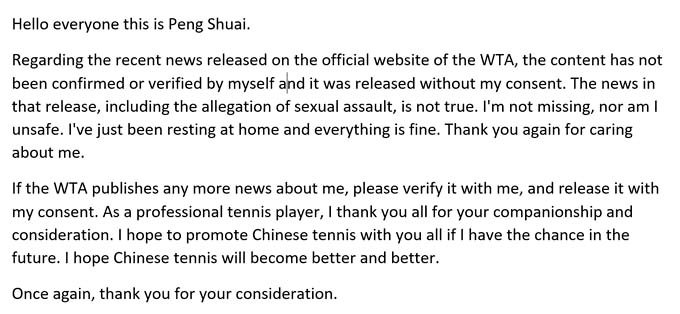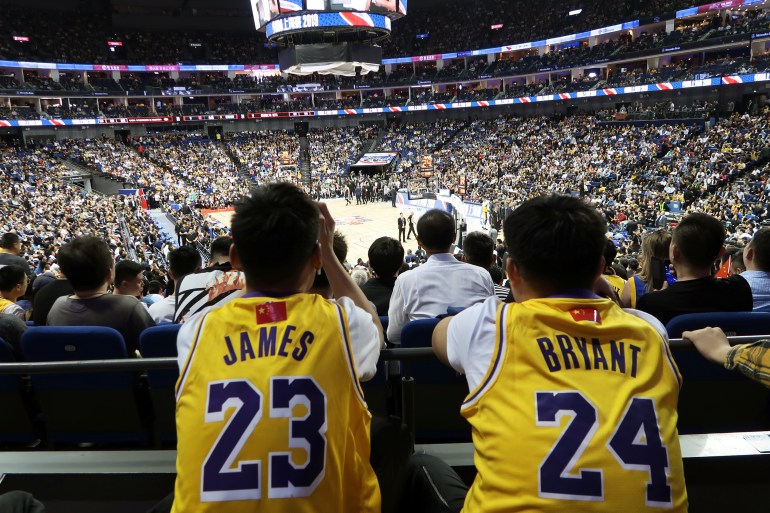Why the Women’s Tennis Association rallied for Peng Shuai | Women’s Rights News
A prominent Chinese citizen associated with a major international organisation disappears, then a letter is sent stating all is well. The organisation appears to accept the letter at face value although questions remain before the citizen emerges months later under duress.
The circumstances are different but there is a similar thread to the disappearance of Chinese tennis player Peng Shuai, who last month accused former Vice Premier Zhang Gaoli of sexual misconduct, and Meng Hongwei, the former head of Interpol, who disappeared on a trip to China in 2018 and 18 months later pleaded guilty to corruption. He was sentenced to 13 years in prison.
Following Meng’s disappearance, Interpol largely appeared to accept his resignation letter and Secretary-General Jurgen Stock told the Associated Press news agency that the international police body was forbidden by internal rules to investigate.
Things could have turned out the same for Peng, a world-class athlete and Olympian, after a social media post about her ordeal with Zhang was deleted, except that the Women’s Tennis Association (WTA) immediately began to push back. Prominent tennis players also followed suit, including Naomi Osaka and Serena Williams.
The WTA has also continued to raise questions even after Chinese state broadcaster CGTN shared an email on Twitter – purportedly from Peng – saying that she was “not missing” or “unsafe” and that reports of her allegations were “not true”. She reemerged in public a few days later and spoke to the International Olympic Committee over a now heavily-criticised video call.
“[It] remains unclear if she is free and able to make decisions and take actions on her own, without coercion or external interference,” WTA Chairman and CEO Steve Simon said afterwards, stressing that the organisation remained concerned about her wellbeing.
 The alleged email from Peng Shuai to Steve Simon that was aired on state broadcaster CGTN last month [CGTN/Twitter via Reuters]
The alleged email from Peng Shuai to Steve Simon that was aired on state broadcaster CGTN last month [CGTN/Twitter via Reuters] After the WTA’s repeated expressions of concern about Peng Shuai’s wellbeing, the IOC said it had held a video call with the player and released a still photo from the call [IOC via EPA]
After the WTA’s repeated expressions of concern about Peng Shuai’s wellbeing, the IOC said it had held a video call with the player and released a still photo from the call [IOC via EPA]Late on Wednesday, the WTA announced the “immediate suspension” of all tournaments in China and Hong Kong. China hosted nine WTA events in 2019 and a year earlier signed a 10-year deal to host the WTA finals in Shenzhen, according to Reuters news agency.
“It’s really crazy that the Women’s Tennis Association has more credibility right now than Interpol in pushing back on China’s gross human rights abuses, abduction of members of its organisation, and poking holes in what is just thinly-veiled coercive statements and propaganda,” said Michael Caster, co-founder of the human rights watchdog Safeguard Defenders, which monitors disappearances in China.
‘Not acceptable’
China’s foreign ministry has accused critics and media of “malicious hyping” and politicising Peng’s disappearance from public view.
Meanwhile, Zhang, the high-ranking party member at the centre of Peng’s allegations, has not been seen in public in several weeks, according to Caster.
He described Peng’s situation as part of the same “playbook” used by the Chinese government when concerns are raised about the wellbeing of a citizen or foreigner living in China – from human rights lawyer Wang Yu to Swedish human rights activist Peter Dahlin who went on to become one of the founders of Safeguard Defenders.
“These farcical public presentations from Peng Shuai are clearly scripted as part of a propaganda effort and we say that because we’ve seen this movie before,” Caster told Al Jazeera.
In announcing the suspension of tournaments, the WTA’s Simon stressed that China’s handling of Peng’s case was not acceptable and should not be allowed to become acceptable.
“If powerful people can suppress the voices of women and sweep sexual assault under the rug then the basis on which the WTA was founded – equality for women – would suffer an immense setback,” Simon said in a statement. “I will not and cannot let that happen to the WTA and its players.”
Game, set, and match to the @WTA in the grand slam for sports and human rights in #China! Steve Simon announces WTA’s decision to suspend tournaments in China… via @WTA https://t.co/LlZ7yW86BQ @hrw @MinkysHighjinks @hrw
— Sophie Richardson (@SophieHRW) December 1, 2021
I applaud Steve Simon & the @WTA leadership for taking a strong stand on defending human rights in China & around the world. The WTA is on the right side of history in supporting our players.
This is another reason why women’s tennis is the leader in women’s sports. https://t.co/PHiU0S7Prw
— Billie Jean King (@BillieJeanKing) December 1, 2021
Other international sporting bodies have already been targeted by Beijing over positions taken by their players and officials.
China briefly stopped airing NBA games after Houston Rockets manager Daryl Morey tweeted his support for Hong Kong’s 2019 democracy protests and erased Premier League football player Mesut Ozil from the Chinese internet after he spoke out against China’s treatment of Muslim Uighurs.
More recently, games involving the NBA’s Boston Celtics have been pulled from broadcast in China as Enes Kanter, their centre, continues to make criticisms about President Xi Jinping and China’s treatment of Xinjiang, Hong Kong, and Tibet while also voicing support for Taiwan.
Moment of reckoning
The WTA, however, had political momentum and timing on its side allowing the organisation to take a calculated risk, says Simon Chadwick, a professor of international sports business at Emlyon Business School in France.
Peng’s case and allegations of sexual misconduct also come at a moment of reckoning in the sports world over #MeToo allegations and mental health following the public struggles of athletes like Osaka and American gymnast Simone Biles.
“Number one for the WTA is that women and girls are their core business. It’s what the organisation is founded upon and to not be seen as supporting someone who apparently has gone missing would undermine what the WTA does,” Chadwick said.
“My feeling is that the WTA probably made a calculation and decided that it stood to lose more globally by not saying anything, then it stood to lose by essentially standing up to China.”
Chadwick says that despite considerable investments in the Chinese tennis industry, women’s tennis has not taken off there as quickly as the WTA initially anticipated.
Its deal with China has also struggled as a result of the pandemic. So far, Shenzhen has hosted only one WTA finals event in 2019. The 2020 final was cancelled as a result of the coronavirus, and the 2021 event was moved to Mexico following another Covid-19 outbreak in China.
 The NBA came under pressure in China after Houston Rockets manager Daryl Morey tweeted his support for the Hong Kong protesters in 2019 [File: Xihao Jiang/Reuters]
The NBA came under pressure in China after Houston Rockets manager Daryl Morey tweeted his support for the Hong Kong protesters in 2019 [File: Xihao Jiang/Reuters]That may give the WTA the kind of latitude unavailable to groups like the IOC, which is due to host the 2022 Winter Olympic Games in Beijing in February. That organisation has also suffered as a result of the pandemic with the Tokyo Olympics, pushed back a year and not attended by the usual number of spectators.
Following Peng’s disappearance, the IOC has said it would “continue our open dialogue on all levels with the Olympic movement in China” following questions about Peng, according to the Associated Press.
Emma Terho, the IOC Athletes Commission Chair, said on Twitter that the organisation prefers a policy of “quiet diplomacy”.
Based in the Republican state of Florida, the WTA may have also felt some political pressure beyond Beijing.
Washington is mulling a boycott of the Winter Games protest against human rights abuses in places like Xinjiang and Hong Kong, notes Chadwick.
“I wonder to what extent there may have been some political pressure from within the United States put on the WTA to respond in the way that it did. I think from the perspective of the WTA, they reacted very, very quickly… unusually quickly, within a matter of two or three days, he said. “And that is extremely unusual.”
On Wednesday, Simon expressed regret at having to suspend events in China, but he said he was “greatly concerned” at the risks players and staff could face if events were held in the country in 2022.
He once again urged Beijing to prove Peng was free, and able to speak “without interference or intimidation” and to fully investigate the allegations of assault.
“I remain hopeful that our pleas will be heard and the Chinese authorities will take steps to legitimately address this issue.”
